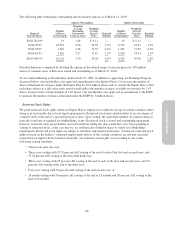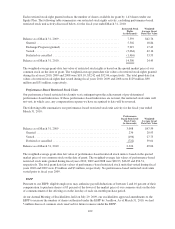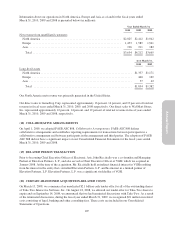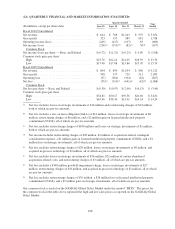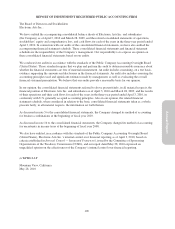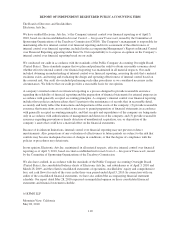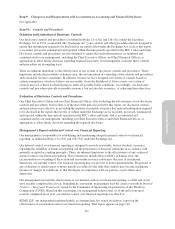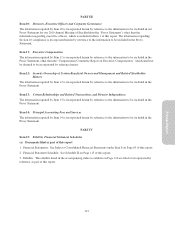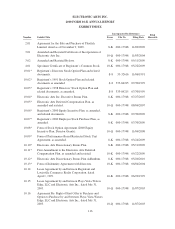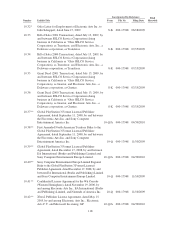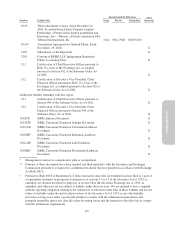Electronic Arts 2010 Annual Report Download - page 189
Download and view the complete annual report
Please find page 189 of the 2010 Electronic Arts annual report below. You can navigate through the pages in the report by either clicking on the pages listed below, or by using the keyword search tool below to find specific information within the annual report.
Annual Report
Item 9: Changes in and Disagreements with Accountants on Accounting and Financial Disclosure
Not applicable.
Item 9A: Controls and Procedures
Definition and Limitations of Disclosure Controls
Our disclosure controls and procedures (as defined in Rules 13a-15(e) and 15d-15(e) under the Securities
Exchange Act of 1934, as amended (the “Exchange Act”)) are controls and other procedures that are designed to
ensure that information required to be disclosed in our reports filed under the Exchange Act, such as this report,
is recorded, processed, summarized and reported within the time periods specified in the SEC’s rules and forms.
Disclosure controls and procedures are also designed to ensure that such information is accumulated and
communicated to our management, including the Chief Executive Officer and Chief Financial Officer, as
appropriate to allow timely decisions regarding required disclosure. Our management evaluates these controls
and procedures on an ongoing basis.
There are inherent limitations to the effectiveness of any system of disclosure controls and procedures. These
limitations include the possibility of human error, the circumvention or overriding of the controls and procedures
and reasonable resource constraints. In addition, because we have designed our system of controls based on
certain assumptions, which we believe are reasonable, about the likelihood of future events, our system of
controls may not achieve its desired purpose under all possible future conditions. Accordingly, our disclosure
controls and procedures provide reasonable assurance, but not absolute assurance, of achieving their objectives.
Evaluation of Disclosure Controls and Procedures
Our Chief Executive Officer and our Chief Financial Officer, after evaluating the effectiveness of our disclosure
controls and procedures, believe that as of the end of the period covered by this report, our disclosure controls
and procedures were effective in providing the requisite reasonable assurance that material information required
to be disclosed in the reports that we file or submit under the Exchange Act is recorded, processed, summarized
and reported within the time periods specified in the SEC’s rules and forms, and is accumulated and
communicated to our management, including our Chief Executive Officer and Chief Financial Officer, as
appropriate to allow timely decisions regarding the required disclosure.
Management’s Report on Internal Control over Financial Reporting
Our management is responsible for establishing and maintaining adequate internal control over financial
reporting, as defined in Rules 13a-15(f) and 15d-15(f) under the Exchange Act.
Our internal control over financial reporting is designed to provide reasonable, but not absolute, assurance
regarding the reliability of financial reporting and the preparation of financial statements in accordance with
generally accepted accounting principles. There are inherent limitations to the effectiveness of any system of
internal control over financial reporting. These limitations include the possibility of human error, the
circumvention or overriding of the system and reasonable resource constraints. Because of its inherent
limitations, our internal control over financial reporting may not prevent or detect misstatements. Projections of
any evaluation of effectiveness to future periods are subject to the risks that controls may become inadequate
because of changes in conditions, or that the degree of compliance with our policies or procedures may
deteriorate.
Our management assessed the effectiveness of our internal control over financial reporting as of the end of our
most recently completed fiscal year. In making its assessment, management used the criteria set forth in Internal
Control — Integrated Framework, issued by the Committee of Sponsoring Organizations of the Treadway
Commission (COSO). Based on this assessment, our management believes that, as of the end of our most
recently completed fiscal year, our internal control over financial reporting was effective.
KPMG LLP, our independent registered public accounting firm, has issued an auditors’ report on the
effectiveness of our internal control over financial reporting. That report appears on page 110.
111


